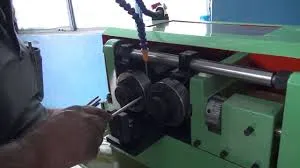Different Varieties of Thread Rolling Machine Products Available in the Market
Types of Thread Rolling Machine Products
Thread rolling is an essential machining process widely used in manufacturing industries to create threads on cylindrical parts. This technique offers several advantages over traditional cutting methods, including increased material strength, improved surface finish, and higher productivity rates. Thread rolling machines come in various types and configurations to cater to different production needs and materials. This article explores the different types of thread rolling machine products and their applications in various industries.
1. Flat Die Thread Rolling Machines
Flat die thread rolling machines are among the most common types used in the industry. These machines utilize two flat dies that move toward each other, creating threads on the workpiece as it passes between them. The process is suitable for producing external threads on cylindrical parts, such as bolts and screws. Flat die machines are highly efficient and can accommodate various workpiece sizes and thread configurations, making them a versatile choice for manufacturers.
2. Circular Die Thread Rolling Machines
Circular die thread rolling machines, on the other hand, employ circular dies that rotate around the workpiece. This method is particularly effective for producing high-precision threads with accurate dimensions. Circular die machines are known for their ability to handle larger workpieces and produce intricate thread forms. They are widely used in the aerospace and automotive industries, where the quality and precision of threaded components are critical.
3. Multi-Station Thread Rolling Machines
types of thread rolling machine products

Multi-station thread rolling machines are designed for high-volume production runs. These machines feature multiple stations where different operations can occur simultaneously. This capability allows manufacturers to produce various threaded components in a single cycle, significantly increasing production efficiency. Multi-station machines are ideal for businesses looking to minimize cycle times and increase throughput, especially in industries that require a large number of similar parts, such as the fastener industry.
4. Portable Thread Rolling Machines
For situations where on-site threading is required, portable thread rolling machines provide a practical solution. These compact machines can be easily transported to various locations and are designed for lightweight applications. Portable thread rolling machines are particularly useful for maintenance and repair tasks, such as rebuilding machinery or structures where threaded components are necessary. Their ease of use and mobility make them a favored choice among technicians and contractors.
5. CNC Thread Rolling Machines
Computer Numerical Control (CNC) thread rolling machines represent a significant advancement in the industry. These machines offer high levels of automation and precision, allowing for complex thread profiles and sizes to be produced consistently. CNC machines can be programmed to handle a wide range of materials and designs, making them ideal for specialized manufacturing needs. Industries such as medical device manufacturing and precision engineering benefit greatly from the flexibility and accuracy of CNC thread rolling.
Conclusion
Thread rolling machines are crucial in producing high-quality threaded components across various industries. The type of machine chosen—be it flat die, circular die, multi-station, portable, or CNC—depends on factors such as production volume, material type, and the specific requirements of the threaded parts. As manufacturing technology continues to evolve, thread rolling machines are expected to incorporate even more innovative features, enhancing efficiency, precision, and adaptability in thread production processes. Manufacturers who invest in the right type of thread rolling machine can significantly improve their production capabilities and achieve better overall product quality.


